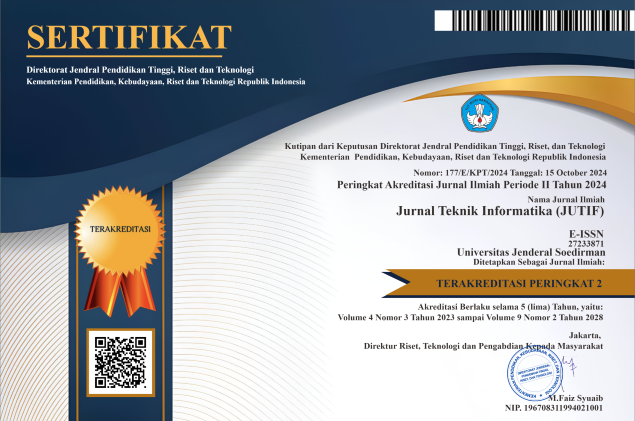DATA MINING CLUSTERING FOOD EXPENDITURE IN INDONESIA
DOI:
https://doi.org/10.20884/1.jutif.2022.3.6.331Keywords:
clustering, data mining, food, k-means, k-medoidsAbstract
The availability of food in a country is determined by a conducive climate. Prolonged droughts, floods, and natural disasters, especially for food crop production areas, will have an impact on the availability of natural disaster conditions faced by all countries including Indonesia is the Covid-19 pandemic, where this will affect food security in Indonesia. Data mining is the process of discovering the hidden meaning of a very large data set. The technique used in this study is Data Mining Clustering and the validity index used is Davies-Bouldin. This study aims to determine the Food Security Strategy in Indonesia through the Data Mining Clustering process based on food expenditure data and the Indonesian people's food expenditure per capita. The methodology used is Cross Industry Standard for Data Mining using the K-Means and K-Medoids Algorithm. The best cluster for the K-Means Algorithm is K=7 with a value of 0.341 and for the K-Medoids Algorithm, it is K=7 with a value of 0.362. This research produces the best algorithm, namely K-Means with a value of 0.341, which has a smaller value than K-Medoids with a value of 0.362. The results showed that the regional. cluster with the highest average expenditure on food was cluster 5 covering the DKI Jakarta area, while the cluster with the lowest expenditure was cluster 6 covering Central Java, East Nusa Tenggara, Southeast Sulawesi, Gorontalo, and West Sulawesi. In cluster 6, it is necessary to implement a strategy to increase food security by increasing production capacity and food reserves in each region.
Downloads
References
R. Chaireni, D. Agustanto, R. Amriza Wahyu, and P. Nainggolan, “Ketahanan Pangan Berkelanjutan,” J. Kependud. dan Pembang. Lingkung., vol. 1, no. 2, pp. 70–79, 2020, [Online]. Available: http://jkpl.ppj.unp.ac.id/index.php/JKPL/article/view/13.
Z. R. S. Elsi et al., “Utilization of Data Mining Techniques in National Food Security during the Covid-19 Pandemic in Indonesia,” J. Phys. Conf. Ser., pp. 1–7, 2020, doi: 10.1088/1742-6596/1594/1/012007.
Han and Kamber, Data Mining Concepts and Technique. San Francisco: Diane Cerra, 2006.
C. C. Aggarwal, Data Mining : The Textbook. New York: Springer, 2015.
N. Ye, Data Mining: Theories, Algorithms, and Examples. New York: Taylor & Francis Group, 2014.
K. Fatmawati and A. P. Windarto, “Data Mining : Penerapan Rapidminer Dengan K-Means Cluster Pada Daerah Terjangkit Demam Berdarah Dengue ( DBD ) Berdasarkan Provinsi,” CESS (Journal Comput. Eng. Syst. Sci., vol. 3, no. 2, pp. 173–178, 2018.
X. Wu et al., Top 10 algorithms in data mining, vol. 14, no. 1. Minnesota: Taylor & Francis Group, LLC, 2009.
A. Alqurneh, A. Mustapha, and N. M. Sharef, “A Partitioning-based Approach for Clustering COVID-19 Drugs and Co-Medication for Safe Use,” Int. J. Integr. Eng., vol. 5, pp. 224–232, 2020.
S. Sindi, W. R. O. Ningse, I. A. Sihombing, P. P. P. A. N. . F. I. R.H.Zer, and D. Hartama, “Analisis algoritma k-medoids clustering dalam pengelompokan penyebaran covid-19 di indonesia,” J. Teknol. Inf., vol. 4, no. 1, pp. 166–173, 2020.
W. Yustanti, N. Rahmawati, and Y. Yamasari, “Klastering Wilayah Kota/Kabupaten Berdasarkan Data Persebaran Covid-19 di Propinsi Jawa Timur dengan Metode K-Means,” J. Inf. Eng. Educ. Technol., vol. 04, no. 01, pp. 1–9, 2020.
A. Doroshenko, “Analysis of the Distribution of COVID-19 in Italy Using Clustering Algorithms,” IEEE Third Int. Conf. Data Stream Min. Process., pp. 325–328, 2020.
I. Budiman, “Data Clustering Menggunakan Metodologi CRISP-DM Untuk Pengenalan Pola Proporsi Pelaksanaan TRIDHARMA,” Iniversitas Diponegoro Semarang, 2012.
F. N. Dhewayani, D. Amelia, D. N. ALifah, B. N. Sari, and M. Jajuli, “Implementasi K-Means Clustering untuk Pengelompokkan Daerah Rawan Bencana Kebakaran Menggunakan Model,” J. Teknol. dan Inf., vol. 12, no. 1, pp. 64–77, 2022, doi: 10.34010/jati.v12i1.
I. T. Julianto, D. Kurniadi, M. R. Nashrulloh, and A. Mulyani, “Comparison Of Data Mining Algorithm For Forecasting Bitcoin Crypto Currency Trends,” JUTIF, vol. 3, no. 2, pp. 245–248, 2022.
A. F. Khairati, A. A. Adlina, G. F. Hertono, and B. D. Handari, “Kajian Indeks Validitas pada Algoritma K-Means Enhanced dan K-Means MMCA,” Pros. Semin. Nas. Mat., vol. 2, pp. 161–170, 2019.



























